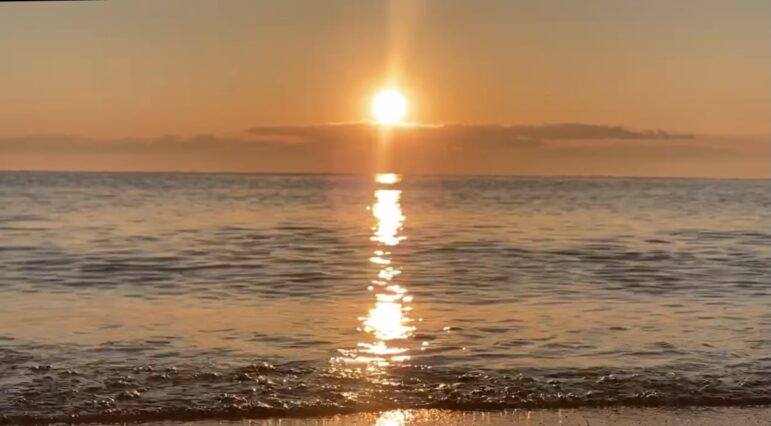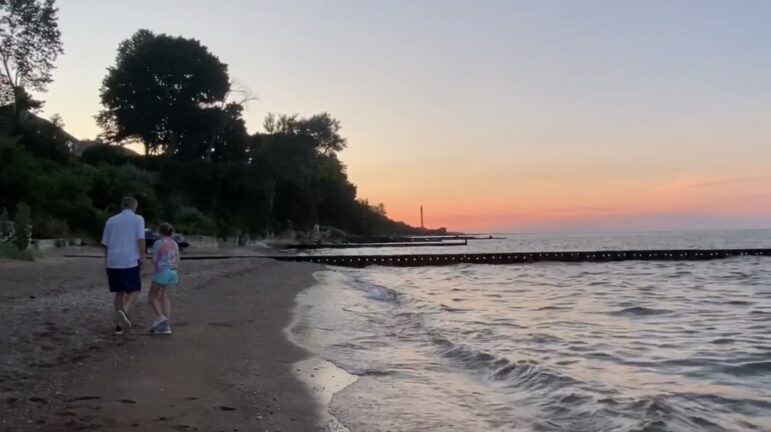
Audrey Richardson
Waves crash along Lake Michigan’s shoreline during sunrise at Tower Road Beach in Winnetka, Illinois on April 22, 2021.Climate in Chicago
As summer approaches, Chicago residents will likely be heading straight to the beaches that surround the city. Unfortunately, they will also have to prepare for extreme heat.
According to the Environmental Protection Agency, one of the most devastating effects of climate change is extreme heat in cities caused by the urban heat island effect. This phenomenon describes the intense warming in cities that occurs when dark surfaces like buildings and concrete absorb and retain heat, increasing temperatures significantly.
Clinical Associate Professor for Environmental and Occupational Health Sciences at University of Illinois in Chicago Susan Buchanan said the impact of climate change on Chicago is most evident in the extreme heat and flooding.
Senior Illinois Clean Energy Advocate for the Natural Resources Defense Council J.C. Kibbey echoed concerns with Chicago’s extreme heat.
Referring to the 1995 Chicago heat wave that caused over 700 heat-related deaths in the city. “As the climate gets hotter, depending on how much hotter, we could be experiencing a heat wave like that every couple years,” he said.
Policy Advocate for the Environmental Law and Policy Center Tyler Barron said population density intensifies climate problems.
“Any major impact that climate change has on people in general is largely the same in Chicago, but just to a much greater scale,” he said.
Flooding in Chicago has occurred for centuries, but as climate change becomes more prevalent, these flooding events become more frequent.
Two of Chicago’s most prominent attractions are Lake Michigan, which creates 28 miles of beaches, and the Chicago River, which flows through the busy city and provides recreational and industrial uses.
“As the lake gets higher and the levels start to be more extreme in their variance, it causes all kinds of problems for that system,” Kibbey said.
These problems include beach erosion, flooding mitigation and water cleanliness for residents.

Audrey Richardson
A father and daughter walk along Lake Michigan’s shoreline on Maple Street Beach in Winnetka, Illinois on Aug, 12, 2022.The National Oceanic and Atmospheric Administration reported that both annual average temperatures and average annual precipitation have increased significantly, meaning these problems are not going away in the near future.
The North Shore, one of the city’s most affluent communities, is positioned along these beaches that are at risk. New Trier High School senior Sydney Vandevelde said she “grew up on these beautiful beaches,” and that keeping the North Shore pristine “means a lot to me personally.”
Climate in politics
One way to mitigate the disastrous effects of climate change is for politicians to enact legislation. When leaders in the government sign legislation, organizations committed to climate action get to work with the resources allotted to them in the legislature.
Environmental Protection Specialist at Illinois Environmental Protection Agency Cassandra Metz gave an example of what the Climate and Equitable Jobs Act means for the EPA.
“The Illinois EPA will be disbursing electric vehicle rebates through the passage of the Climate and Equitable Jobs Act,” she said.
Many organizations in the Chicago area such as the EPA, NRDC and ELPC are committed to addressing the climate crisis in Chicago.
Barron said that the ELPC is one organization out of a very diverse group of people working toward the same goal.
“We see ourselves as a part of a much broader coalition of organizations trying to find solutions,” he said.
These organizations work hand-in-hand with Chicago’s political leaders to create climate solutions. Ultimately, the politicians are the people that make the biggest impact on a communities’ climate responses because they can enact laws that require cooperation.
Ultimately, “politicians hold the purse,” Barron said. “You really can’t have ambitious, meaningful, impactful climate policy without the politician.”
Buchanan urged residents to prioritize politicians who are committed to finding and implementing these solutions.
“Vote for leaders who prioritize climate change mitigation,” she said.
One politician who has made an impact in Chicago is Governor J.B. Pritzker. He campaigned on the promise of prioritizing climate change action and has made several attempts at achieving this. Prtizker was inaugurated on Jan. 14, 2019 and he has just begun his reelection campaign for the 2022 Governor race.
Prtizker’s moves
Within 10 days of being in office, on Jan. 23, Pritzker signed the United States Climate Alliance. After President Donald Trump vowed to withdraw the United States from the Paris Agreement, Pritzker joined the alliance vowing to reduce carbon emissions consistent with the pact.
His next official move to combat climate change was in August, 2020. He outlined eight principles that would move Chicago toward a more renewable energy future. While this wasn’t a law that Chicago residents would be impacted by, the city gained an understanding of his plans and priorities on the issue. This announcement also paved the way for his involvement in the passing of the Climate of Equitable Jobs Act.
Arguably the most impactful play from Pritzker was successfully passing CEJA in September, 2021, which Barron said was “probably one of the most ambitious climate bills in the country.” This legislation creates initiatives to reach the target of getting Chicago to 100% clean energy by 2045. The law highlights clean energy investments and job creation. The bill gave powers to government organizations in Chicago that are involved in environmental regulation.
Barron shares his opinion on how politicians play a role in fighting climate change and Pritzker’s actions while in office.
Moving forward
Pritzker’s leadership during his first term has made an impact that will continue to be seen in future years, Metz said, additing that Pritzker’s leadership is “certainly a step in the direction of a clean energy future.”
That being said, Barron said there is still a lot of work to be done.
“I think It’s important to never be satisfied when it comes to this type of work,” he said.
Vandevelde said leaders have the obligation to continue to fight for climate change, even after successes, like CEJA.
“There’s definitely more they can do,” she said.

Audrey Richardson
A duck swims across Lake Michigan during sunrise at Elm Street Beach in Wilmette, Illinois on June 30, 2021.
When trying to find solutions to a problem that is so complex, Barron said that it becomes difficult to communicate what needs to be done next, and what should take priority.
“Finding that healthy balance between acknowledging the problem but acknowledging the solutions I think is really important,” he said.
Kibbey said one of the most important things is for residents to talk. He said there is a disconnect between how many people say they care about climate change and how much they talk about it, and that bringing the climate crisis to light in everyday conversations can make a real impact.
“We all need to talk more about it with our friends, with our neighbors and also with our legislators and elected officials,” he said.
In an issue where “every hundredth of a degree matters,” Kibbey said that whether or not Pritzker is reelected in 2022, residents need to continue to voice their concerns for the climate crisis.
“Your voice matters in the legislative and policy making process,” he said.